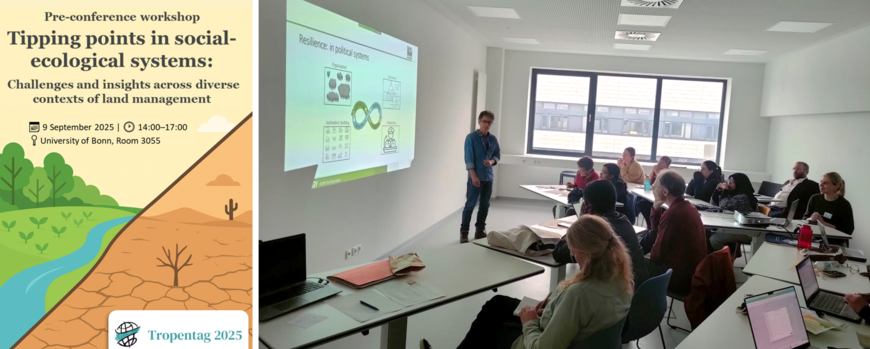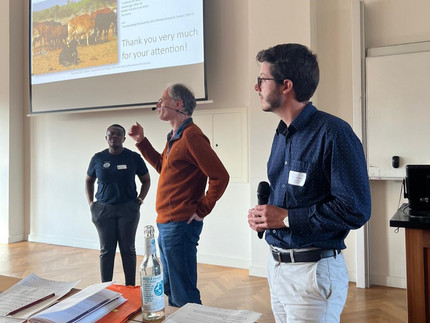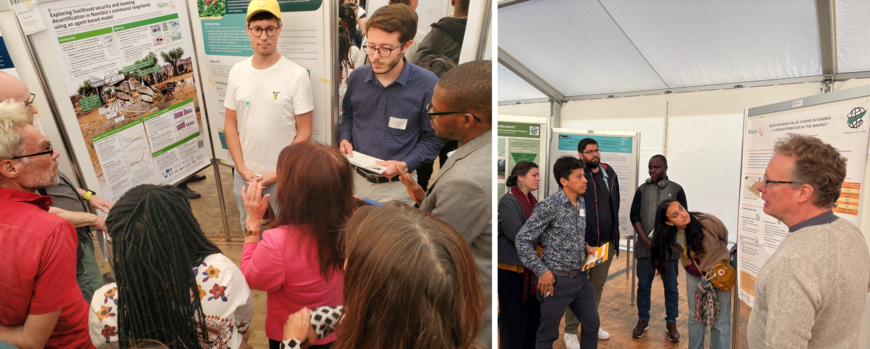September 2025: NamTip project well represented at the Tropentag 2025 conference
Several NamTip members were actively involved in the Tropentag 2025 conference, held in Bonn from 9-12 September 2025. The event began with a pre-conference workshop organized by NamTip scientists, open to all participants and interested attendees, titled "Tipping Points in Social-Ecological Systems: Challenges and Insights Across Diverse Contexts of Land Management" (Fig. 1). The workshop brought together researchers from multiple disciplines to explore tipping points in social-ecological systems (SES) across a range of landscapes - including rangelands, forests, and agricultural systems. Expert presentations were given by NamTip scientists and invited guests, fostering cross-project dialogue within the GlobalTip research network.
Dr. Stefan Liehr opened the workshop with a presentation on key concepts and challenges in tipping point research, highlighting desertification tipping points in drylands, a core focus of NamTip, and offering examples from other environmental contexts. Dr. Gunnar Dressler then shared results from a modelling study on long-term social-ecological dynamics in Namibia’s communal rangelands, examining the likelihood of tipping points and possible mitigation strategies to strengthen livelihood security and SES resilience. Invited speaker Dr. Kai Behn (University of Bonn) presented findings from a long-term drought simulation experiment in South Africa, which mirrors NamTip’s TipEx experimental platform. His talk focused on the resistance, resilience, and recovery of vegetation under sustained drought stress. Dr. Lukas Drees (MORE STEP project) discussed indicators and drivers of tipping points in Mongolian steppe ecosystems, while Dr. Daniel Callo-Concha (Prodigy project) shared how their research observed greater-than-expected SES resilience, challenging assumptions about cascading effects from soil degradation to socio-economic and climatic systems.
The presentations were followed by a lively discussion on the drivers, early-warning signals, and impacts of tipping points. Participants reflected on the shared insights, highlighting both conceptual and methodological challenges, such as data limitations, uncertainty, and the integration of social and ecological perspectives.
But the involvement of NamTip members in Tropentag 2025 extended well beyond the pre-conference workshop. Throughout the main conference sessions, several NamTip scientists presented their latest research findings and chaired discussions across multiple thematic areas.
Dr. Thomas Bringhenti chaired a session on "Rangelands and Forage", where Lisa-Maricia Schwarz presented results on how drought and intensive grazing influence rangeland productivity, and how land-use history affects the ecosystem’s response to these pressures. In the same session, Dr. Stefan Liehr shared insights from a case study on the Namibian freehold farming sector, illustrating approaches to stabilize rangeland social-ecological systems (Fig. 2). Dr. Gunnar Dressler contributed a poster presentation showcasing modelling results on how population growth and recurrent droughts impact the livelihood security of communal farmers in Namibia (Fig. 3, left). In a session focused on economic aspects, Dr. Markus Rauchecker presented findings on bush biomass value chains in Namibia - including charcoal, woodchips, and wood pellets - comparing their levels of development and identifying the factors that enable or hinder their transformation (Fig. 3, right). Finally, Lisa-Maricia Schwarz also chaired an online poster session on "Biodiversity", further highlighting NamTip’s broad engagement in the conference and its commitment to advancing interdisciplinary research on sustainable land management.



